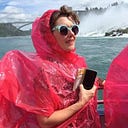Community Storytelling in Libraries
Facts Inform us but stories influence us
Library staff hear amazing stories from the people that visit our libraries every day. Stories about their lives, stories about how being in the library changes their lives, and stories about the opportunities open to them because of the library’s support for them. Library staff can share these stories to build partnerships, as evidence for grant applications and for advocacy to our organisations for continued funding.
To help us tell the stories of the good that libraries do in the community we need to build our community storytelling skills. For us at Yarra Plenty Regional Library local Melbourne storyteller Lara McKinley helped some of us identify, practice and use new storytelling skills.
The top 5 basic skills we learned:
- How to Find Stories: Lara shared with us 5 universal story themes that speak to everyone. Belonging: finding a sense of belonging & community in your library. Friendship: finding that social connection, friend or love in the library. Overcoming Adversity: solving a problem, or meeting a challenge through the library. Learning: finding opportunity & skills or a job through the library. Journey: sharing a person’s journey — to the library, to the town, to their vocation — look deeper at some of your library members journeys for that surprising journey.
- How to Frame Your story: there is a difference to what want to say and what your audience wants to hear. Finding the common ground helps to frame your story & help it resonate with your audience rather than earnestly trying to share the library message.
3. How to interview somebody effectively: Build connection by sharing a little about yourself. Be Prepared — know what questions you want to ask but remember this is a conversation so go where the conversation leads you. Listen: for good grabs & ask your open-ended questions in new ways for deeper answers. Be responsive & genuinely curious about their answers. Don’t forget the “Anything else you would like to add?”
4. How to take good photos: Choose your location, remember good lighting is essential, what is the visual story you are trying to tell — add the props, focus, focus, focus!
5. Some Quick Editing Tips: Transcribe the interview by recording it on your phone. Listen back to grab the best quotes — remember lengthy quotes can be summarised by you. Assemble the quotes — these do not need to be in the order they were told to you. Get signoff from your interviewee before publishing and make sure they know when it will be published.
Staff put their new skills into practise immediately with a story campaign for Library and Information Week 2022. We captured the stories of seven library users and shared one a day on social media, where they were very popular, especially on Twitter. You can read the stories HERE. My favourite quote is from Umberto:
“At 92, I live each day one by one, because you never know what to expect, but I am always telling everyone, ‘Go to the library, it is where you learn and it saved my life’.”
Some wonderful community stories were also captured around Victoria, Australia for the Public Libraries Victoria Libraries Change Lives campaign. Click below for this lovely one of a brother and sister finding each other again.
